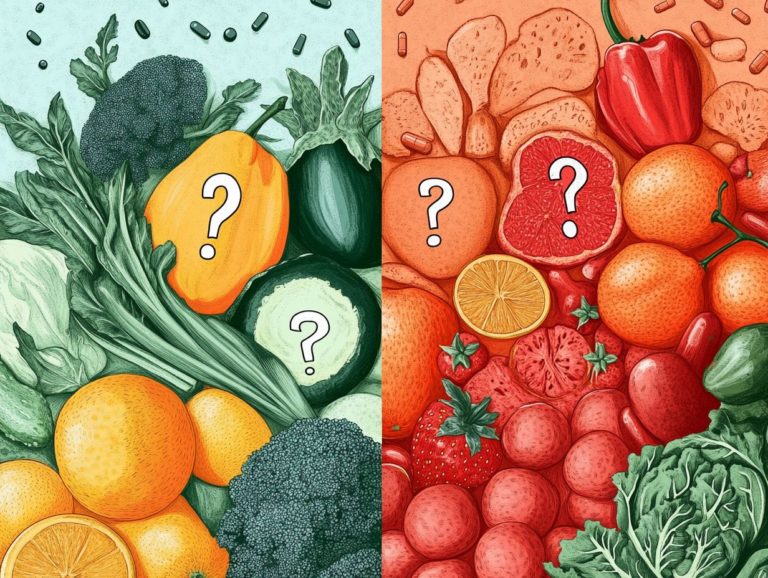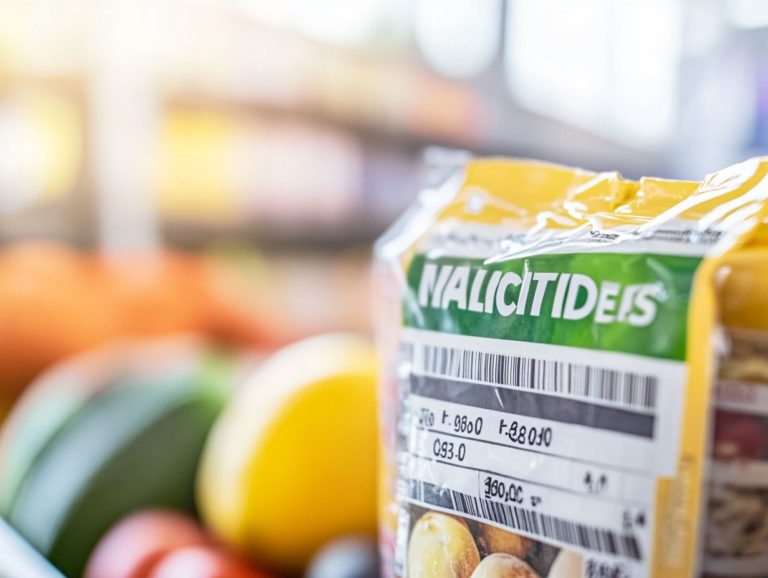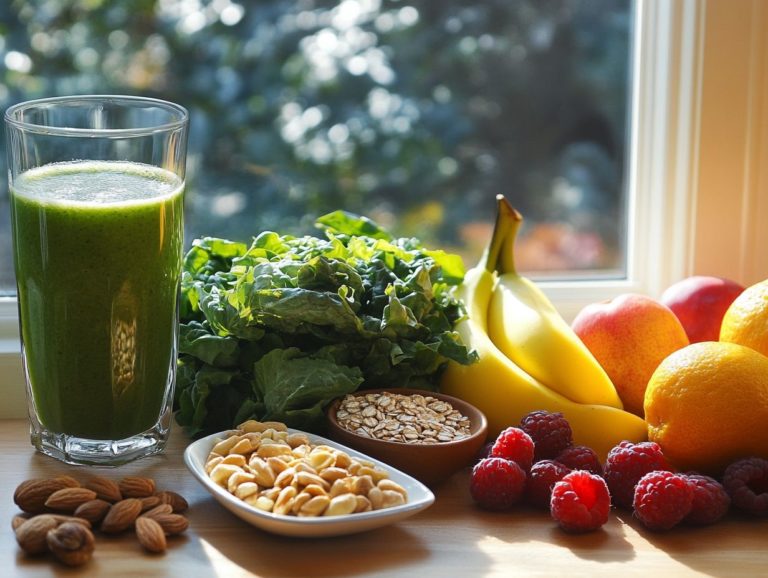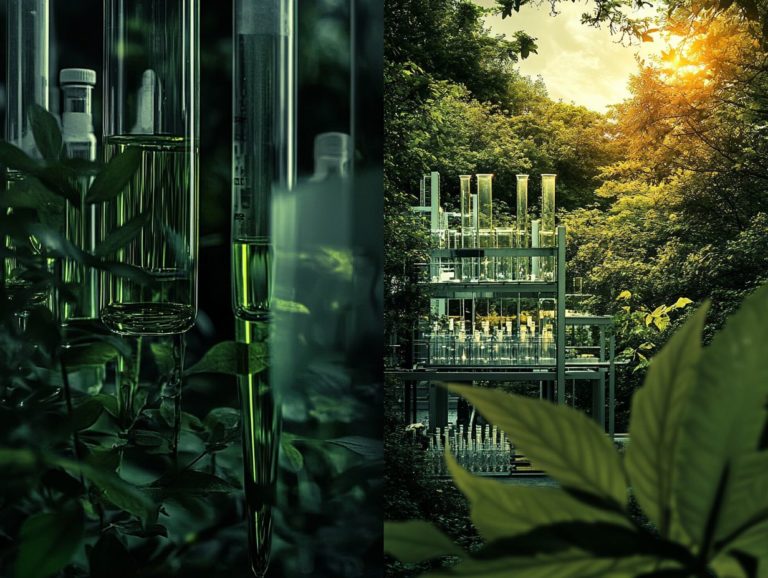Debunking Common Protein Myths
Protein is frequently hailed as a dietary powerhouse, vital for muscle growth, repair, and overall health. Yet, misconceptions abound, causing many to misinterpret its role in the body and the best ways to integrate it into your diet.
Concerns about high-protein diets harming kidney function and skepticism regarding the adequacy of plant-based proteins are just a couple of the myths that circulate. Get ready to discover the truth about protein!
Don t miss out on improving your health read on!
Contents
- Key Takeaways:
- Understanding Protein and Its Role in the Body
- Myth #1: High Protein Diets are Bad for Your Kidneys
- Explanation of the Myth
- Studies and Evidence Contradicting the Myth
- Myth #2: Plant-Based Proteins are Incomplete
- Explanation of the Myth
- Research on the Completeness of Plant-Based Proteins
- Myth #3: You Need to Consume Protein Immediately After Working Out
- Debunking Other Common Protein Myths
- Frequently Asked Questions
Key Takeaways:

High-protein diets do not harm your kidneys. In fact, studies show that they may actually improve kidney function.
Plant-based proteins are complete sources of protein and can fulfill your daily protein needs.
The timing of protein consumption after a workout is not as crucial as commonly believed. Focus on meeting your overall daily protein needs instead.
Understanding Protein and Its Role in the Body
Understanding protein and its multifaceted role in your body is essential for optimizing your health and fitness.
Protein is a macronutrient made up of amino acids, serving as the foundational building block for your muscles, tissues, and enzymes. It helps with muscle building and repair and plays a key role in various bodily functions, including hormone production and immune support.
Whether you choose animal or plant-based sources, ensuring you achieve the right protein intake is essential for meeting dietary reference intake and supporting overall health and well-being.
What is Protein?
Protein is a vital macronutrient composed of long chains of amino acids, essential for numerous functions within your body. These amino acids are classified into two groups: essential and non-essential.
Essential amino acids cannot be synthesized by the body, meaning you must obtain them through your diet, while non-essential amino acids can be produced internally.
The intricate chemical structure of protein, with its unique sequences and interactions, plays a pivotal role in various bodily processes, including muscle development and growth. Adequate protein intake supports the synthesis of new muscle tissue, facilitates recovery, and promotes overall health by maintaining cellular functions, hormone production, and immune responses.
Recognizing the significance of this macronutrient can profoundly enhance your wellness and performance.
Functions of Protein in the Body
The functions of protein in your body are remarkably diverse, influencing everything from muscle building to enzyme production.
It s crucial for muscle repair, aiding recovery after exercise and helping maintain lean tissue. Protein also plays an essential role in immune function, supporting the production of antibodies that protect you against pathogens.
It s vital for hormone regulation, ensuring that your metabolic processes operate smoothly and efficiently. Don t overlook its contribution to energy production, especially during times when your carbohydrate intake is low.
If you prioritize your health, understanding these multifaceted roles can underscore the importance of including sufficient dietary protein in your daily nutrition, ultimately enhancing your overall well-being.
Myth #1: High Protein Diets are Bad for Your Kidneys
One of the most persistent myths surrounding protein is the notion that high-protein diets can harm kidney health, often causing people to shy away from the essential protein intake necessary for muscle growth and overall well-being.
This misconception stems from misunderstandings about how protein affects kidney function and is frequently fueled by misleading health narratives. While it’s important to be aware of individual protein requirements especially for those with pre-existing kidney issues extensive research indicates that a balanced, high-protein diet is generally safe for healthy individuals.
By debunking this myth, you can make more informed dietary choices that support your health and fitness goals.
Explanation of the Myth
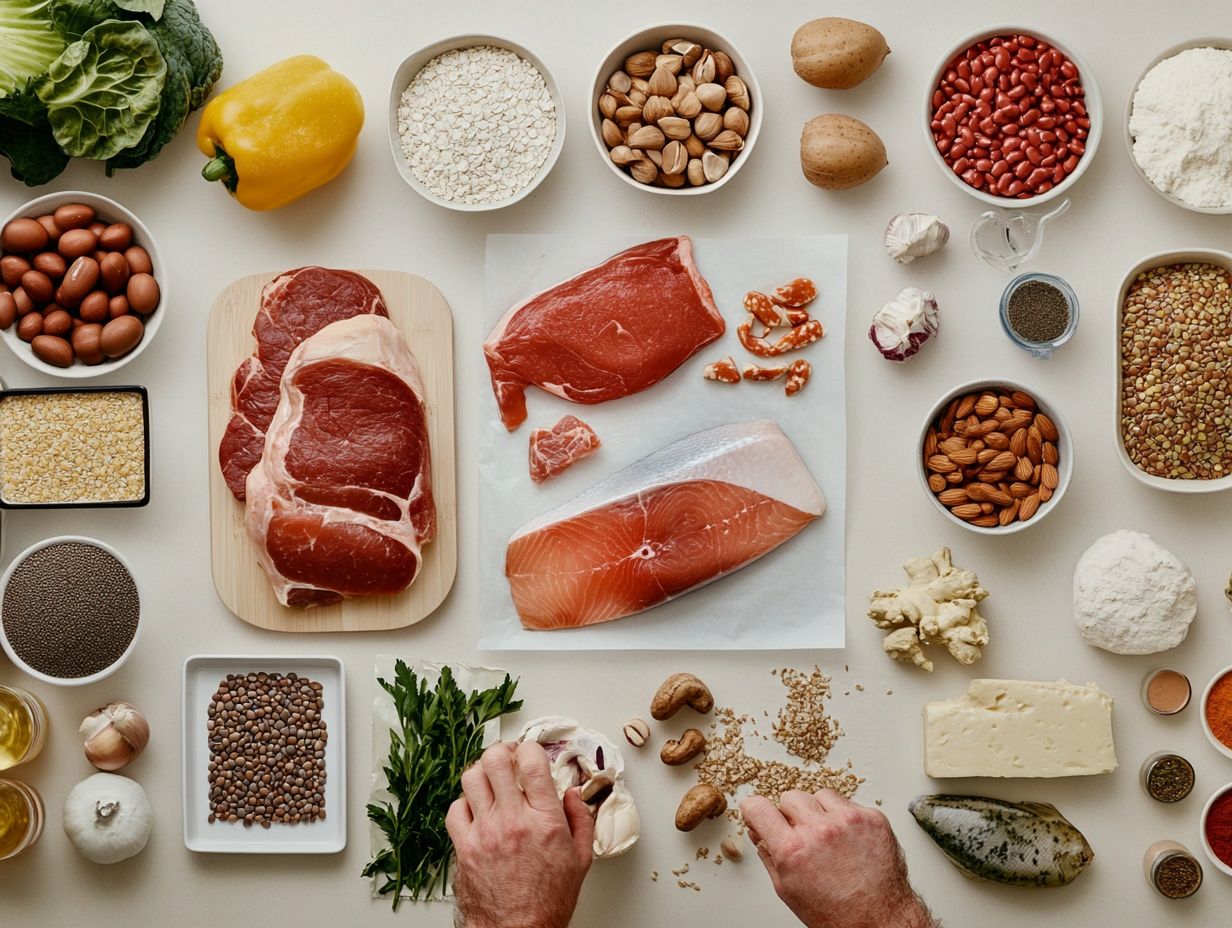
The myth that high-protein diets harm kidney health stems from the belief that excess protein might burden these essential organs. Early studies hinted at a link between protein intake and kidney issues, but those findings have often been oversimplified.
Diet recommendations frequently reinforce these claims, leading many to shy away from protein-rich foods. Research indicates that healthy individuals do not suffer adverse effects from higher protein consumption. A recent study in the *Journal of Nutrition* shows that those without pre-existing kidney conditions can safely consume up to 2.0 grams of protein per kilogram of body weight.
Experts emphasize the importance of distinguishing between the general population and those at risk. The latter group may indeed need to monitor their intake more closely. Educating yourself about this topic is vital for dispelling these myths and fostering a balanced approach to nutrition.
Studies and Evidence Contradicting the Myth
Numerous studies explore the relationship between high protein diets and kidney health, providing evidence that challenges the common myth.
A study published in the *American Journal of Clinical Nutrition* shows that healthy individuals can safely consume higher levels of protein without harming kidney function. This highlights the body s remarkable ability to adapt to increased protein intake.
Another study in the *Journal of Nutrition* finds that while high protein diets are effective for healthy individuals, those with pre-existing kidney conditions may face complications. This underscores the need for personalized dietary strategies.
These findings reinforce the significance of recognizing individual health needs. An increased protein intake can be beneficial for many, but it s essential to exercise caution for certain populations.
Myth #2: Plant-Based Proteins are Incomplete
Myth #2 claims that plant-based proteins are incomplete, lacking the essential amino acids vital for muscle growth and overall health. This misconception often leads individuals to dismiss plant-derived protein sources in their diets.
This narrow view can prevent people from adopting a balanced nutritional approach that includes various protein options. By understanding how to combine plant-based proteins effectively, you can meet your protein needs without solely relying on animal sources.
Don t let this myth hold you back plant-based proteins can be just as powerful!
Explanation of the Myth
The belief that plant-based proteins are incomplete often comes from the misconception that they lack one or more essential amino acids needed for optimal nutrition. This misunderstanding overlooks the impressive variety of plant-based proteins available, many of which can meet all essential amino acid requirements when combined thoughtfully.
Take legumes, for instance like lentils and chickpeas. When paired with whole grains such as quinoa or brown rice, they create a complete protein profile.
Grasping the significance of amino acids is crucial for anyone planning their diet, especially those focused on muscle protein synthesis. By incorporating diverse sources, you enhance not only your strength but also your overall health, proving that a well-rounded plant-based diet delivers substantial nutritional benefits.
Research on the Completeness of Plant-Based Proteins
Research indicates that many plant-based proteins can be complete when consumed in the right combinations, effectively providing all essential amino acids.
Studies show that strategically pairing different sources like legumes with grains achieves a well-rounded amino acid profile. For example, combining beans with rice or lentils with quinoa enhances protein quality and elevates the overall nutrient content of your meals.
The significance of dietary diversity cannot be overstated. By incorporating a variety of plant foods, you ensure that you receive sufficient protein along with vitamins, minerals, and phytochemicals crucial for optimal health.
A thoughtful approach to plant-based eating can play a crucial role in meeting all your nutritional needs.
Myth #3: You Need to Consume Protein Immediately After Working Out
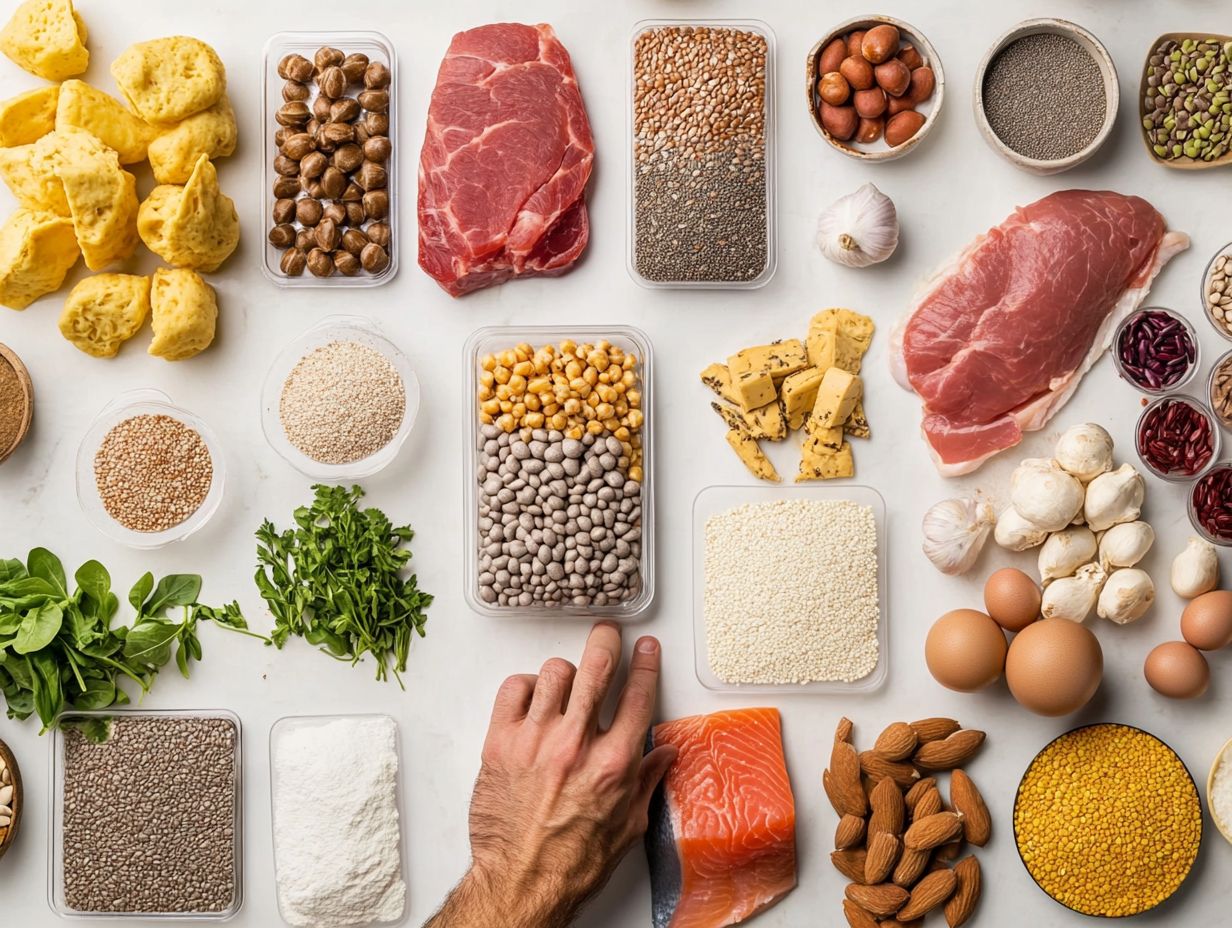
The idea that consuming protein right after a workout is essential for muscle recovery is a widespread myth. This misconception often confuses fitness enthusiasts about the best timing for protein intake.
This belief promotes a concept known as the ‘ideal time to recover.’ During this period, protein consumption is thought to significantly enhance muscle recovery.
However, recent research challenges this traditional view. It indicates that the timing of protein intake may not be as critical as previously believed.
What truly matters is ensuring you meet your overall protein goals throughout the day. This approach plays a more significant role in supporting muscle mass and overall health.
Explanation of the Myth
The myth about immediate post-workout protein consumption often comes from the idea of the ‘anabolic window.’ This term suggests a narrow timeframe during which muscle recovery is maximized.
This belief has influenced the dietary habits of many athletes, pushing them to prioritize protein shakes or bars right after workouts.
Yet, the scientific community is starting to question this rigid perspective. While consuming protein post-exercise offers benefits, the exact timing may not be as critical as once thought.
Factors like your overall daily protein intake and meal composition play pivotal roles in muscle recovery. You may find that maintaining a balanced diet throughout the day is just as important, if not more so, than consuming protein immediately after exercise.
Evidence Showing the Timing of Protein Consumption is Not as Important
Evidence suggests that your protein consumption timing is less important than your overall intake for optimal muscle recovery.
Recent studies show that distributing your protein evenly across meals leads to better muscle recovery and growth than consuming larger amounts in one sitting.
Research in the ‘American Journal of Clinical Nutrition’ finds that consistent daily protein intake effectively stimulates muscle recovery, regardless of when you eat it in relation to your workouts.
One study also highlights that athletes who maintain steady protein intake throughout the day enhance their recovery and overall performance.
This shows just how vital it is to keep your protein steady throughout the day! So, make sure you re getting enough protein at every meal to support your goals!
Debunking Other Common Protein Myths
Besides the common myths about protein intake, several misconceptions can significantly affect your dietary choices and health outcomes.
For example, the idea that protein is only for muscle building or that a vegan diet cannot provide enough protein can lead to poor nutritional decisions. These myths often result in misguided advice that doesn’t serve your best interests.
Understanding and debunking these misconceptions is crucial for enhancing your protein knowledge. This knowledge promotes balanced dietary habits that align with your individual health goals.
Myth #4: Protein is Only Important for Building Muscle
One common misconception is that protein is just for building muscle, while its many health benefits often go overlooked.
In reality, protein is essential for various bodily functions critical to your overall well-being. For instance, it plays a significant role in immune function by helping create antibodies that fight infections and diseases.
Proteins also assist in hormone production, influencing everything from metabolism to mood. They help with energy metabolism; when carbohydrate intake is low, amino acids from proteins can convert into glucose, providing vital energy.
Therefore, ensuring a balanced intake of protein is essential for maintaining health across these systems.
Myth #5: You Can’t Get Enough Protein on a Vegan Diet

Don t let myths hold you back! The notion that you can t meet your protein needs on a vegan diet is a widespread myth that might prevent you from fully embracing plant-based nutrition.
Numerous studies show that a well-planned vegan diet can easily satisfy your protein requirements through various sources. For example, legumes like lentils and chickpeas are great sources of protein.
These legumes are also packed with essential nutrients such as iron and fiber.
Quinoa is another standout because it acts as a complete protein, meaning it contains all the essential amino acids your body needs. Don t forget about nuts and seeds, like chia and hemp, which deliver both healthy fats and generous amounts of protein.
Research has found that those who follow plant-based diets often consume adequate protein while enjoying a diverse array of meals. This effectively dispels the myths surrounding protein deficiency.
Frequently Asked Questions
What are some common myths about protein?
There are several common misconceptions about protein. Many people believe it is only important for bodybuilders or that animal protein is the only effective source.
Is animal protein the only source of protein?
No, there are many plant-based sources of protein that are just as effective as animal protein. These include beans, lentils, tofu, and quinoa.
Can you consume too much protein?
Yes, consuming excessive amounts of protein can have negative effects on the body. This includes putting strain on the kidneys and increasing the risk of certain health problems.
Is it necessary to take protein supplements?
Protein supplements are not necessary for most people. Most individuals can easily obtain enough protein through a balanced diet, but supplements may be beneficial for those with high protein needs or certain dietary restrictions.
Will eating more protein help me lose weight?
Eating more protein alone will not necessarily lead to weight loss. A caloric deficit is still necessary for weight loss, and it is important to maintain a balanced diet that includes all food groups.
Is plant-based protein inferior to animal protein?
No, plant-based protein can provide all essential amino acids and is a healthy option for those following a vegetarian or vegan diet. It is also typically lower in saturated fat and cholesterol compared to animal protein sources.

